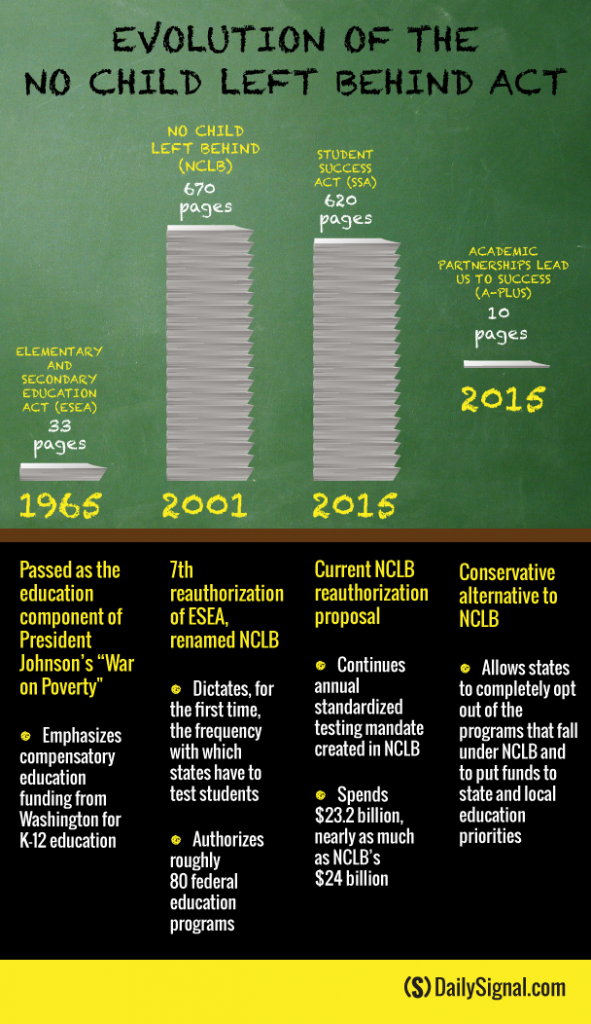This week, the House of Representatives will vote on an ambitious rewrite of the No Child Left Behind Act, which is the most far-reaching K-12 federal education law ever created.
Under consideration is a 620-page proposal called the Student Success Act (H.R. 5), which Republican leadership says will scale back Washington’s involvement in local education.
But conservatives say the measure doesn’t go far enough in doing that.
“This proposal spends nearly as much as No Child Left Behind, is nearly as long in page length, and fails to give states an option to opt out of the law,” said Lindsey Burke, The Heritage Foundation’s Will Skillman Fellow in Education. “As it stands, it’s a huge missed opportunity to restore state and local control of education.”
The Obama administration also opposes the legislation, fearing that it would be detrimental to schools nationwide. If the bill were to reach his desk, the president’s education secretary, Arne Duncan, suggested that Obama would issue a veto.
“As of today, this isn’t something we could support,” he told a group of reporters on Monday.
The Student Success Act would consolidate dozens of programs authorized under the Elementary and Secondary Education Act (now known as No Child Left Behind) and grant states more flexibility in how they use roughly $2.3 billion federal education dollars.
The problem, conservatives say, is that the legislation only gives states flexibility within a limited range of the programs that fall under No Child Left Behind, and more importantly, it does not allow states to completely opt out of the law, which has long been their goal.
In an effort to fix that, Rep. Mark Walker, R-N.C., and Rep. Ron DeSantis, R-Fla., introduced an amendment to the Student Success Act that would allow states to withdraw completely from almost every aspect of No Child Left Behind—if they so choose.
A-PLUS
“Innovation starts locally—not in Washington,” said Walker of the conservative amendment, called Academic Partnerships Lead Us to Success (A-PLUS).
Teachers and parents know best how to meet the unique needs of their children and students, and we have seen time and time again that Washington’s top-down approach does not work.
A-PLUS has been introduced in various Congresses and was intended to provide an alternative to states that did not want to participate in No Child Left Behind. For years, states have pushed back against No Child Left Behind due to its mandates and unworkable policies.
DeSantis said the amendment “liberates states from burdensome and ineffective regulations, providing local communities with the flexibility to use federal education funding for programs that they believe will best increase the success of students in the classroom.”
Now, with Republican control of both the House and Senate, conservatives argue that Congress has an opportunity to gives states a way out from federal control of K-12 education.
Portability
In addition to allowing states to withdraw from the 80-plus programs created under No Child Left Behind, conservatives are also advocating for policies that expand the concept of portability, which is perhaps the opposition’s biggest point of contention with the Student Success Act.
As it’s currently written, the Student Success Act would allow states to make Title I dollars allocated to low-income school districts to be portable to public and charter schools.
In a perfect world for conservatives, students could use Title I dollars in a private school of their choice.
In doing so, money could follow a student to an education option that best suits his or her unique learning needs, which proponents argue provides students who are trapped in failing schools a way out.
“Title I formula funding is some of the most complex in education law and all too often, does not reach the students who it was intended to help,” said Burke. “Portability would move towards funding students instead of districts and empower families with control over education policies that affect their children every day.”
Democrats believe portability robs funds from vulnerable, low-income school districts, and instead directs them to wealthier school districts that don’t need Title I dollars.
Duncan said the current portability provision included in the Student Success Act would be “devastating” to the nation’s poorest schools, stripping them of education funding they can’t afford to lose.
“Rather than helping improve the schools that need it most, the Republican bill would actually cut investments in these schools while increasing funds for some of the wealthiest areas in the country,” he said in a statement.
That approach is backward. We can’t just cut our way to opportunity. Our kids deserve better. Every child—no matter his or her ZIP code—deserves a quality education, including access to high-quality preschool and a fair shot at getting ahead.
Bipartisan Solution?
As an alternative, the Senate Education Committee is drafting their own version of the Student Success Act, one that they believe could pass with bipartisan support.
“Bipartisan discussions between [Sen. Lamar Alexander, R-Tenn.,] and [Sen. Patty Murray’s, D-Wash.,] staffs on fixing No Child Left Behind are moving along well, and Sen. Alexander remains positive that they can reach agreement on key issues,” an aide for Alexander, who chairs the Senate Education Committee, told The Daily Signal yesterday.
“Sen. Alexander remains positive that they can reach agreement on key issues. [He] hopes to fix this broken law to help states, school districts, and schools better serve all students,” she added.
Alexander and Murray have not released details of the proposal.
With the Obama administration already suggesting that the president would veto the Student Success Act—and the Senate working on their own bipartisan version—the chances of enacting any legislation that includes the conservative A-PLUS solution are bleak.
But that won’t stop Walker from trying.
“The president has threatened to veto practically everything under the sun and yesterday’s veto of Keystone clearly showed he is more interested in playing politics than working with Congress,” said Walker, adding:
Parents and teachers—not government bureaucrats—should have the ultimate say in education. They know best how to meet the unique needs of their children and students. A-PLUS further empowers states and offers greater flexibility in federal education spending. It is smart, conservative education reform that strengthens the broader goal of the Student Success Act to remove the federal government from classrooms.


























